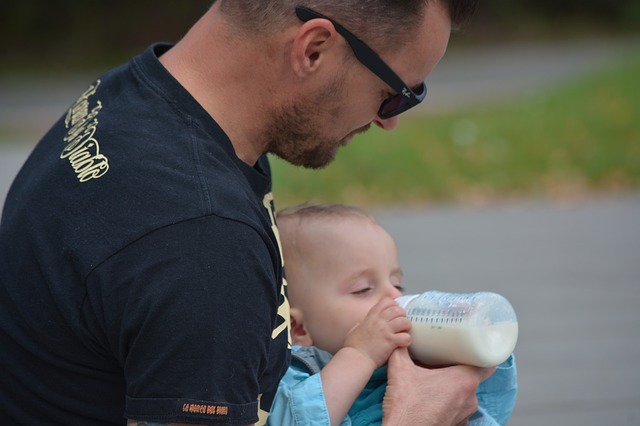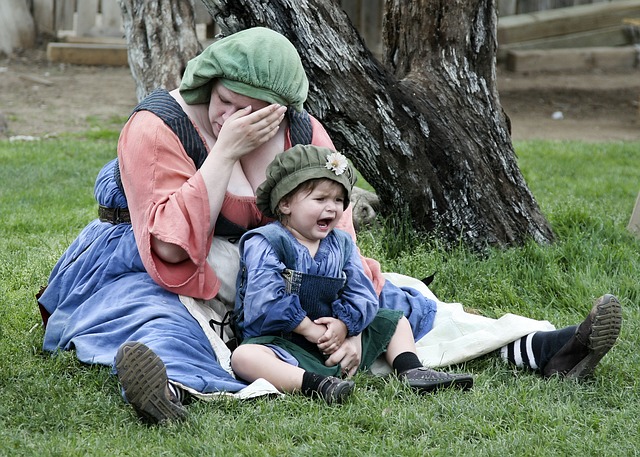Life ain’t easy! Handling emotion through doing mothering
The germans have a saying “Das Leben ist kein Ponyhof”, meaning that life is not a pony court. Seems fun and obvious at the same time. Something we all know, right? Life ain’t easy. Every person has their own personal struggles. So what is so special about the everyday actions of mothers managing emotions?
(Image source: lovethispic.com)
THE DADDY FACTOR
It is no secret that, still nowadays, most childcare is done by women. Still nowadays when asked, most people will answer that they truly think women are more suitable for the task. Mothers are still the primary care of children, even though, to be fair, there is increasingly more participation of men in children's lives.
However, in spite of the progressive participation of men in childcare and development, all the same in most divorce cases children end up staying with mothers. In that process most women become responsible alone for managing their children's lives in many aspects, and the emotional is a strong one. For fathers it is more socially accepted to be barely present and contribute very little to the child development, if so. In such cases, the evidence that mothers are more strongly supportive in emotional matters is very clear.
If a father does not care for its offspring, but provides economic support, it is still viewed as enough. It is seen as “natural” behaviour. Whereas a woman is “naturally” built for the mothering work. If a woman decides not to have children, it is viewed as “unnatural”. Still nowadays many people think maternity as the purpose of being a woman.
Though things seem to be changing. In Brazil, for example, there have been in the last years a new trend among fathers in the pop culture. Those fathers talk publicly about fatherhood and want to fully participate on the lives of their children. Yet, it is far away from being the rule for all families, and far away from a perfect balance between genders (if something like that really is possible at the moment). It is good that things are changing, but even if men are being more participative in children’s lives, much of the family emotional work is still done by women.
(Image source: Pixabay)
MOM KNOWS IT ALL
Motherhood has different meanings for different kinds of culture, people create their personal assumptions of what a good mother should be depending on how they have learned that. However, even within the more conflictive ideal of motherhood, it is a consent that being a mother is much more than giving birth to a child. Much of what a mother should be is related to the predominant ideology of the role that women have in determined society.
Drawing on the Freudian idea a mother should be a woman that knows how to mother or to do mothering intrinsically. And by doing mothering, she occupies a central place in the life of her children, centralizing on her all the satisfactions of the child’s basic needs. It is not much different than thinking that women are “naturally” build for the tasks of mothering.
The thing is that there is a counterpart to that. Since the mother occupies this central place, every good outcome is viewed as the outcome of the mothering style adopted. But if the mother fails to successfully fulfill what is regarded as her duty, if her mothering style did not fit well the expectations or something has gone wrong, then there is always someone to blame. And that is: the mom! And then there are a lot of mothers out there feeling guilty for what went wrong with their kids, and a bunch of other mothers feeling entirely responsible for the achievements of her kid, even if they do not live with her anymore and have their own lives. For me, this is a very problematic view of motherhood and child/mother dependency.
(Imagem source: Pixabay)
There is always this tendency to immaculate the image of the mother; either as the perfect, pure, fairy godmother with magical powers that solve all things; or the vixen, the incompetent, unskilled; a woman that is unsuitable as a mother. In general, it is acceptable that a men would not have the proper skills of doing mothering, they might not qualify for showing tenderness, warmth and affection because they simply did not learn that. The ones capable of doing mothering are almost “like a mother”, heroes for doing the same tasks women have been doing for centuries.
I think we are not all good or all bad, but a mix of all the good and bad things that happened to us and the ways we learned to deal with all of that. Therefore, I do not believe mothers are to blame for all the things one did not manage to accomplish, for all things that went wrong in life. Even if a great part of our apprenticeship on how to deal with our own emotions comes from our mothers, they are not the responsible for our own choices, therefore, they are not responsible for our unfavourable outcomes. On the other hand, mothers are also not responsible for every good accomplishments and success one’s managed within their lives. In short, mothers are not to blame for the path we choose to ourselves, even if they are highly involved in our lives.
(Imagem source: Pixabay)
However, consciously or not, they have showed for centuries the way for their children to strive and navigate throughout life. An important part of mothering is to help kids on how to name and how to deal with the emotions that come with life events. Mothers have been doing this with whatever they have available: networks, ideologies, philosophical frameworks, social tools, sets of practices, economic capabilities and so on.
MANAGING EMOTIONS
When I was in São Paulo interviewing mothers for my research, most of them would have problems managing time. Many mothers I know are always thinking about time management and how consuming it is. I am also always having problems managing my time.
Managing time is, in great part, about the choices and decisions we make in our daily living. However, managing time is also managing emotions. To feel emotionally stable most individuals have to “feel” that they have handled well their daily tasks, and for most mothers that involves her children and homes, whatever this means for everyone of them. To handle well the daily tasks, we have to deal with all the emotions that come from the most common experiences we live.
For mothers, that means as well dealing with the emotions that comes with her children’s experiences. With that, arises the necessity to help them, by providing a possible repertoire on how to name the feelings and sentiments that arise with such emotions.
(Imagem source: Pixabay)
When a mother comforts her kid in distress, when she deals with a confused, frustrated, stubborn, impatient kid, or even when dealing with a cheerful, overwhelmingly happy child, she is working a set of emotions. That is something one only learns within practice. At the same time, the child is learning this set of emotions, and will probably reproduce the same way of dealing with such emotion along its life. Even with the changes that happen throughout the way, something we have learned emotionally from our mothers always remain, be it good or bad.
Mothers are the constant example that life is not about what happens to you, but how you deal with what happens to you. They are constantly managing their own emotions as well as helping their children with their emotions.
An important part of living in society is to learn how to identify and express emotions. In a child’s first infancy the connection to the mother’s emotions is incredibly strong, the emotional reference of a child is, in general, the mother. It seems unnecessary to say how determinant this relationship is for how someone will deal with their emotions when adults.
Our first contact with emotions is already in the womb. A mother's emotional state can have consequences in the development of the child inside the womb, suggest this study reported by The Guardian. I could even find a manual on how to teach emotions to your child.
A mother’s emotion work is important for child development, yet we know little on how these learned ways of dealing with emotions are reproduced socially throughout adult daily life. What we know, is that mothers are always teaching something, and emotions are a great part of this deal.
(Imagem source: Pixabay)
Managing emotions composes motherhood. Most mothers find ways of keeping the emotional balance, manipulating feelings (in the sense of feeling something and showing something else), and so on. An important part of the daily practice of mothering is constantly working our emotional state.
So, getting back to the initial question: what is so special about the everyday actions of mothers managing emotions? I would say that it is precisely the emotional legacy of the many diverse ways of dealing with emotions, which in turn are determinant for how we position ourselves in our daily encounters, sociabilities and so on.
Independently if we think emotions are an innate feature, or if we also think they are a result of our social environment and sociability, emotions are known to be commonly associated to women. So, I would say that the more we talk about the emotions that doing mothering triggers, the more we will be able to understand the ways society in general deals with emotion, and reproduces certain ways of viewing them.
(Imagem source: Pixabay)
To finish, I would love to read your impressions on this topic! Also if someone has a story to share about how the relationship with their mother helped (or messed up!) their emotional education I would be glad to read it!
If you like it, don’t forget to leave a comment, upvote, resteem and follow!
Love, Gloria







wow! nice blog i have upvoted ur blog please upvote and comment on my blog also and follow me.
Thanks :)